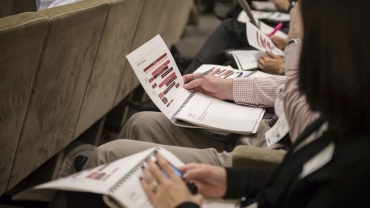
Technology democratises services (interview)

Technology democratises services, increases public transparency and shortens the distance between rulers and citizens, says Richard Abadie, partner at PwC, leader of global capital projects and infrastructure group.
The post-pandemic reality poses new challenges for local governments, including healthcare. What should local leaders do to make the recovery process as effective as possible?
To begin with, it is worth asking about the real scope of their competences. In the UK, for example, most decisions are taken centrally; locally they are merely implemented. In my opinion, this paradigm needs to be considered. In the case of healthcare, the fundamental question is what shape the system should take - should it be based on a dozen or so centrally managed hospitals, or should it be based on a larger number of facilities managed by local governments? I believe that central planning - without cooperation with local communities - has lost its raison d'être today. At the same time, the alignment on a central level is more needed than ever to ensure a consistent system that best uses the resources and optimises the investment.
A similar discussion is also taking place in Poland, where hospitals remain in the hands of local authorities. There are opinions that their network is too dense and functioning in close proximity of two facilities providing the same services does not make sense. What is the real situation?
In Saudi Arabia, for example, large state-owned companies build their own hospitals for their employees, which leads to the existence of several facilities with similar profiles in the immediate vicinity. It would be much more useful to have one common facility. The key is smart planning. The health care system must be unified and based on cooperation at different levels. Overcapacity can also cause problems, not to mention the huge maintenance costs.
How can we get out of this?
The target capacity of the system needs to be established at the very beginning, taking into account technological developments. Before the pandemic, consulting a specialist without first seeing a GP was impossible in the UK. Now, thanks to a special app, I can get almost instant video advice from one of the doctors spread across the country, and if necessary a referral to a specialist. Thanks to technology, it is possible, at a low cost, to significantly improve the efficiency of the system and break down some of the barriers between central administration and local government. Access to medical services becomes easier and more equitable. This is important, especially in view of increasing urbanisation. People living in rural areas must not be deprived of care, although it must be planned carefully; building large hospitals in sparsely populated areas does not make sense.
When thinking about new technologies and the state as a service provider, it is perhaps hard to downplay the role of central government in setting new standards and managing infrastructure?
This is not possible at local level, which is why cooperation is so important. The application I mentioned was developed centrally, but it is the local authorities that must act as intermediaries in the provision of medical services; after all, patients cannot be forced to travel to the other end of the country. The state must ensure access to basic healthcare even in the remotest corners of the country - this is what social solidarity requires and this argument is often raised by local authorities.
Can we say, then, that what is important is a rational assessment of the real needs of a community, and that this cannot be achieved without cooperation?
This is where I see the biggest drawback of centralisation: it can lead to the marginalisation of people on the fringes of society. After all, norms are set based on the needs of the majority, and that must lead to exclusion and inequality. That is why it is so important to listen to the voice of the periphery, which cannot be done without the cooperation of government and local structures.
In your opinion, this type of partnership has a global future?
Yes, and this will be fostered by the increasing openness of public life, which social media, for example, contribute to. Politicians are already able to withdraw from certain decisions under the pressure of voters online. In the UK, the government wanted to stop funding school meals for the poorest pupils, but as a result of a public campaign initiated by footballer Marcus Rashford, the decision was reversed. Government must, as never before,take into account the opinion of the electorate.
But what about when leaders - not just political ones - close themselves off to the opinions of others? Many organisations are built around a strong leader. We know of cases of "cowboy" management style in technology companies, for example.
I think society will become more open as time goes on. The leaders you refer to are largely people of the current 50s generation, used to a 'my way or no way' style of management. However, this approach will fade with the rise of technology and social awareness. We are currently in a transitional phase of such a change.
And is change even cost-effective?
Let us look at carbon emissions: they are becoming to be regulated more by financial institutions than governments! No one is going to invest in outdated technology, such as a diesel plant, because it will not bring them a profit, especially in a long term. In this case the quasi-regulator is the markets, in others it could be anyone: lobbyists, think-tanks or even societies as a whole. In Australia, shareholders recently voted against paying salaries to the board of a mining company that destroyed a cave with priceless Aboriginal paintings. The distance between owners, shareholders and the public is shortening, and the old bosses are giving way to a younger generation for whom transparency or sensitivity to inequality is very important. I believe that a similar change awaits us in the political sphere as well.
Interview by Marek Tejchman, Dziennik Gazeta Prawna.
The Polish version of this interview is available at https://bit.ly/3urlOGU
Subscribe for a newsletter
Stay up to date with the latest news
Contact us




